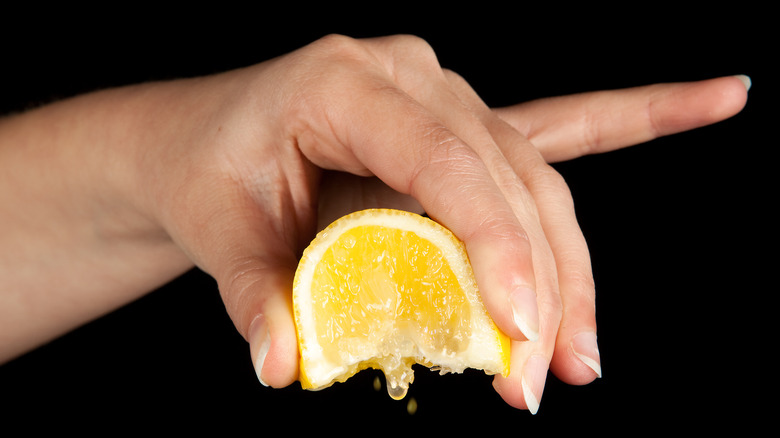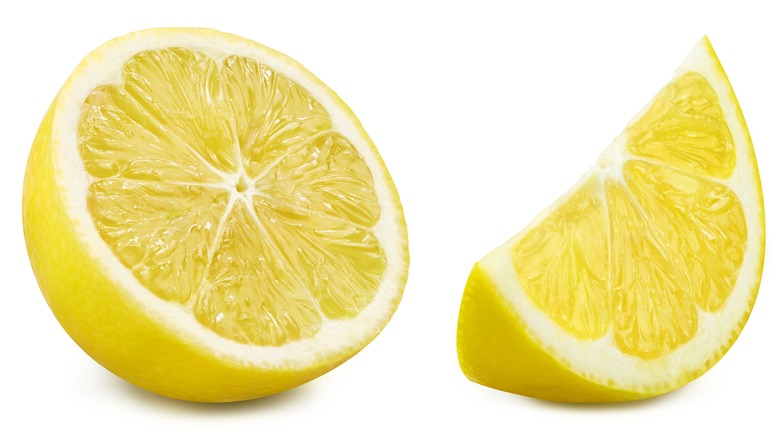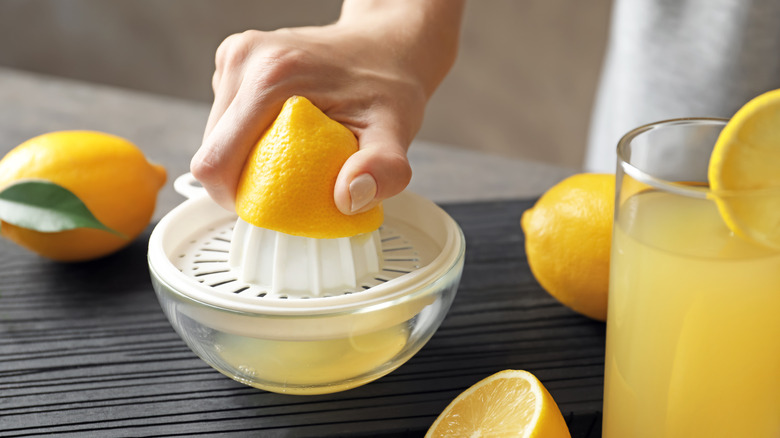Stop Lemon Wedges From Spraying Juice Everywhere With A Simple Hack
Nothing brightens up a dish quite like fresh lemon juice. It adds depth, balances out bitterness, and brings out other flavors of many recipes as well. From chicken and fish to desserts and cocktails, a good squeeze of lemon is often just what your culinary creations need to taste perfect. But, pinching that citrus wedge can also leave you running for cover when the juice spurts out in every possible direction (like, in your eye). While you can hold your other hand over the fruit to block any rogue projectiles, even then your hands will be dripping with citric acid, and in that case, let's hope you don't have any paper cuts.
While it may seem unavoidable, as with so many things in life, there's a hack for that. And, like many of other hacks, it's so simple that it may leave you thinking, "Why didn't I think of that?"
The secret to a spray-free experience with a lemon wedge lies in removing the white, pithy material. It acts as a barrier of sorts, disrupting the direct flow of the juice that's trying to "escape" the fruit when you squeeze it. Yet, lemons, like all citrus, are full of pith, so if you think it's going to be a nightmare getting all of it out, don't worry. Once the lemon is cut into wedges, it takes literal seconds to achieve squirt-free pieces.
How to calm down the lemon spray
English television personality Ruth Langsford posted a clip on Instagram of friend @hungrywomancooks showing her followers how to prep the perfect lemon wedge, one that will not spray in a thousand different directions once squeezed. In the video clip, the lemon wedges have already been sliced — so be aware that, in order for this trick to work, the lemons need to be cut in half longways, from tip to tip, and not through the wide middle.
Once halved, cut each piece into wedges. Next, lay each wedge down on one of the flat sides and simply cut the long, white membrane or pith material so you are left with a clean, smooth piece of fruit. Then, when you squeeze it onto your food, into your cocktail, or iced tea, the juice will go right into your target and not on you, the counter, or the person sitting next to you.
In addition, the wedges will simply look cleaner, sharper, and more attractive without the white material on top. You can set a bowl of them on the table, place individual pieces onto plates, or (in the case of beverages) secure a wedge to the rim of a glass for a pretty finishing touch.
The juiciest ways to juice lemons
Now, there are plenty of ways to juice a lemon, including using an electric juicer, a reamer, and a handheld squeezer. All of these are great if it's just the juice you're extracting for a recipe, a cocktail, or a pitcher of lemonade. But, it hardly makes sense to place individual citrus reamers next to each plate at a dinner party (it's usually customary to give guests their own lemon wedge when serving things like shrimp, lobster, crab legs, crab boils, etc.).
If you're prepping food in advance for guests, there are ways to get the most juice out of any given lemon wedge. When the fruit is still whole, roll it firmly on a cutting board or counter top. This will help break down the individual pockets of juice inside the lemon. Be warned though: When you cut the lemon into wedges, it will probably leak a good amount of juice out, so be sure you use a very sharp knife that will quickly and easily glide through the citrus. Microwaving whole lemons will have a similar effect.
Finally, if you stick a fork inside a lemon wedge while squeezing it, this, too, should puncture those juice pockets and release more liquid onto your food. Be careful, though, the fork tines might impede the juice from spraying out in a straight line, subtly ruining all your hard pith-removing work.



